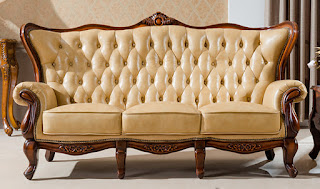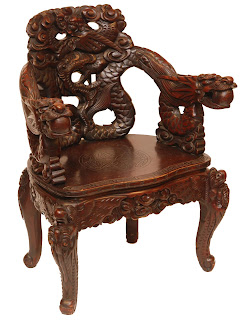Wood Carving is a sculpture in Chinese culture often knows referred to as "FOLK ART". Wood carving is a separate type of work out of the woodwork. It is divided into three categories: "Three dimensional carvings", "Root carving", "Relief sculpture". Wood carving uses several techniques including circular engraving, basso-relievo and hollow engraving. Most wood carving applies color to protect the wood. The form of Chinese furniture evolved along three distinct lineages which dates back to 1000BC, based on frame and panel, yoke and rack and bamboo construction techniques. Chinese home furniture evolved independently of Western furniture into similar forms including chairs, tables, stools, cupboard, cabinets, beds, and sofas. Until the 10th century CE the Chinese sat on mats or low platforms using low tables, in typical Asian style, but then gradually moved to using high tables with chairs.
Chinese furniture is mostly
in plain polished wood, but from at least the Song Dynasty, the most
luxurious pieces often used LACQUER to cover the
whole or parts of the visible area. Carved lacquer furniture was at first only
affordable by the Imperial family or the extremely rich, but by the 19th
century was merely very expensive, and mostly found in smaller pieces or as
decorated area on larger ones.
Chinese Furniture
is usually light where possible, from the Qing Dynasty furniture
made for export, mostly to Europe, became a distinct style, generally made in
rather different shapes to suit the destination markets and highly decorated in
lacquer and other techniques.
Classic furniture is typically made of a class of hardwood, known
collectively as ROSE WOOD. These woods are denser than
water, fine grained and high in oils and resins. These properties make
dimensionally stable, hardwearing, hot and insect resistant.

Many basic patterns established during the song dynasties continued to mature throughout the Yuan and Ming periods into beautiful well-rounded and robust forms that were smoothly finished with thick lacquer coating and finely detailed with painted decoration.
Chinese
furniture began to develop some of its distinguishing characteristics:
- The use of
meditation Chairs, large enough to sit cross legged in.
- Tall yoke chairs
where the feet are to rest on a bottom stretcher day beds.
- Opium beds where
one can sit cross legged and use small tables to eat from or write on
while sitting on a mat or platform.
- Use of thick
lacquer finish
- Exotic hardwoods
- Detailed engraving and paintings for ceremonial purposes and artistic expression sacred mountain images, Dragon and Clouds, birds and flower all had specific Taoist connotation.
This platform also gives an avenue for everyone to post or share a related Story/Experience about a furniture or wood work or anything art or craft design on the comment box or send your works to EMAIL : mfwshareyourstory@gmail.com specifying your (Name, and Details of your work) and watch your comments become a major post for people to view and relief that experience with you. Pictures are also highly welcomed along side your posts. Acknowledgements and Full credits would be given to those who deem it fit to share their related posts with this platform.
Please Share With Us How You Feel About This Post..























